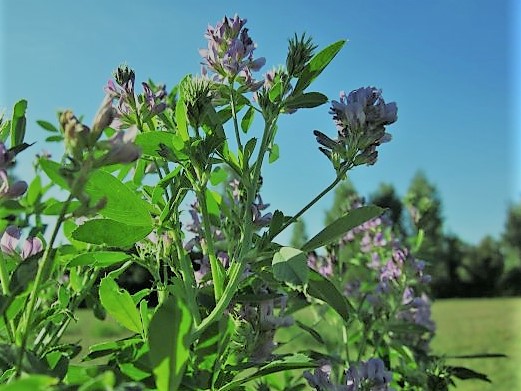Alfaalfa Seeds
Alfalfa, additionally referred to as lucerne or medicago sativa, is a plant that has been grown as feed for livestock for loads of years. It turned into long prized for its superior content of nutrients, minerals, and protein in comparison to different feed resources .
Alfalfa is part of the legume circle of relatives, however it’s also taken into consideration an herb. It appears to have in the beginning come from south and vital asia, however it has been grown around the world for centuries.
Similarly to being used as feed, it has a protracted records of use as a medicinal herb for people. Its seeds or dried leaves may be taken as a supplement, or the seeds can be sprouted and eaten inside the shape of alfalfa sprouts.
Alfalfa
Alfalfa is a perennial legume that typically lives four-eight years, but can live more than two decades as well, depending on climate and variety. Erect or ascending, glabrous perennial flowering plant grow to the height of one m (3. 3 ft.) tall and is discovered growing in wide kind of climatic environments from cold temperate to heat sub-tropical. It prefers friable, wealthy, nicely-drained loamy soil along side free topsoil furnished with lime. It has deep root device, every so often extending more than 15 m (49 toes.). Stems are decumbent or erect up to at least one m excessive, glabrous or bushy within the higher components together with numerous branches. Leaves are normally alternate compound and are olive-inexperienced and trifoliate, 10-45 mm lengthy and three-10 mm broad; pubescent on lower floor, glabrous on top surface, coarsely toothed. Leaflets are typically slender, rectangular to ovate or obovate, 8–28 mm x three–15 mm, glabrous on higher layer, really pubescent on decrease floor. Plant life are hermaphrodite, approximately 1/3″ lengthy; consist of 5 petals which are lavender or red, 10 stamens, a unmarried pistil, and a inexperienced calyx. Flowering usually begins from july to september.


Nutrition
Other than their bland taste alfalfa is a superb supply of nutrients, vitamins and minerals. Eating one hundred gram of alfalfa offers 30. Five µg of nutrition ok, zero. 157mg of copper, zero. 96 mg of iron, 0. 563 mg of diet b5, 70mg of phosphorus, zero.
126 mg of vitamin b2 and eight. 2 mg of nutrition c. Moreover many amino acids like zero. 143 g of isoleucine, zero. 134 g of threonine zero. 267 g of leucine, zero. 145 g of valine and 0. 214 g of lysine also are located in 100 gram of sprouted alfalfa seeds.
Health benefits of Alfalfa
Improves bowel moves
nutritional fiber is heavily relied on by way of the frame to display and optimize digestive fitness. Dietary fiber isn’t always only able to bulk up the stool and accelerate its motion via the bowels, however it could additionally lessen irritation inside the intestine. Consequently it facilitates in clearing up troubles like indigestion, bloating, cramping, diarrhea, constipation, and a bacterial imbalance in the intestine microflora. Consequently, it is recommended to eat alfalfa tablets regularly for a better bowel motion.
Cholesterol Levels Are Reduced
Dietary fibre, which is crucial in the fight against cholesterol, has been found to be abundant in alfalfa. Fiber, along with a variety of other chemical substances known as saponins, can bind to cholesterol and prevent it from adhering to artery walls. Additionally, it maintains the body’s HDL (good) cholesterol levels in balance. By doing so, plaque accumulation, atherosclerosis, heart attacks, and strokes can be avoided.
Immune System Booster
This sprout is a fantastic immune system booster due to its high vitamin C concentration. Vitamin C functions as an antioxidant to reduce oxidative stress in addition to stimulating the synthesis of white blood cells. Furthermore, this inconspicuous sprout contains both vitamin E and the B vitamins, which both function as antioxidants and metabolic regulators in the body.
Respiratory Fitness
In the past, alfalfa was frequently used to treat viral and bacterial infections as well as respiratory illnesses like bronchitis, the flu, and the common cold. Alfalfa contains anti-inflammatory characteristics that make it effective in treating a variety of breathing disorders, including asthma, as well as boosting the immune system to fight off infections that are affecting the respiratory tracts on a more fundamental level.
Protects the Heart
Alfalfa contains large amounts of potassium and iron, both of which are beneficial to the heart in distinct ways. As a vasodilator, potassium helps to reduce blood pressure by relieving pressure on arteries and blood vessels. Additionally, the iron in these sprouts increases the development of red blood cells, which enhances circulation and guarantees that the body’s organ systems receive adequate oxygen. As a result, the heart will not have to work as hard because the demand for blood and oxygen from the extremities would be reduced.

